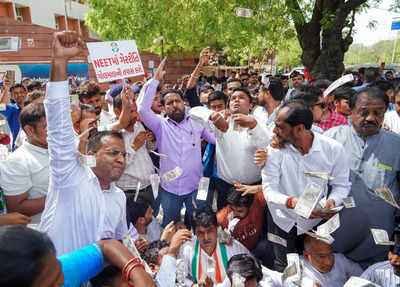- News
- Education News
- News
- Decoded: Centre’s anti paper leak law which came into effect amidst NEET and NET scam; check offences and punishments
Trending
Decoded: Centre’s anti paper leak law which came into effect amidst NEET and NET scam; check offences and punishments
The UGC NET paper leak and NEET UG scam have raised concerns about compromised exam integrity. In response, the Centre has enacted the Public Examinations Bill 2024, an anti-paper leak law designed to address these issues. This new legislation aims to prevent unauthorized access, leakage, and other fraudulent activities in public examinations, ensuring a fair and secure testing process amidst growing scandals.

Anti paper leak law amidst NEET and NET Scam
On June 19, the Union Education Ministry cancelled the UGC-NET 2024 examination after receiving reports suggesting potential breaches in the test's integrity. The UGC-NET had taken place on June 18 in 317 cities nationwide, with over 1.1 million candidates participating. The matter has been referred to the Central Bureau of Investigation (CBI) for further investigation.
The cancellation of UGC NET comes amidst ongoing controversies surrounding the NEET medical entrance exam. Notably, the National Testing Agency (NTA) is the conducting body for both the exams. Additionally, the NEET PG exam, scheduled for Sunday, June 23, has been postponed as a ‘precautionary measure’ following these controversies.
Amidst the ongoing NEET, NET controversy, a notification from the Department of Personnel and Training (DoPT) issued on Friday stated, "In exercise of the powers conferred by sub-section (2) of Section 1 of the Public Examinations (Prevention of Unfair Means) Act, 2024 (1 of 2024), the Central government hereby appoints the 21st day of June, 2024 as the date on which the provisions of the said Act shall come into force."
The UGC-NET exam is the test for securing entry-level teaching positions in Indian universities and for admission to PhD programmes. The cancellation is the first instance of a national level public examination being scrapped after the introduction of the 'anti-paper leak' law by the Union government led by Prime Minister Narendra Modi.
The Public Examinations (Prevention of Unfair Means) Bill, 2024, also known as the 'anti-paper leak' bill, was initially introduced in the Lok Sabha on February 5, 2024. It was passed in the Lok Sabha on February 6 and in the Rajya Sabha on February 9, 2024. Later that month, President Droupadi Murmu signed the bill into law.
The Public Examinations (Prevention of Unfair Means) Act, 2024, was designed to curb the use of dishonest methods in public examinations. These examinations encompass competitive tests organized by various bodies such as the Union Public Service Commission, the Staff Selection Commission, the Railway Recruitment Board, the National Testing Agency (NTA), the Institute of Banking Personnel Selection, and the Union government departments along with their affiliated offices for recruitment purposes.
This law addresses various offenses related to public examinations, prohibiting any collaboration to engage in dishonest practices. These unfair practices encompass gaining/giving unauthorized access to or leaking question papers or answer keys, providing assistance to candidates during exams, and manipulating computer networks, resources, or documents that are involved in the shortlisting or finalizing of merit lists or rankings. According to PRS Legislative Research, conducting fake examinations, issuing counterfeit admit cards or offer letters for fraudulent or monetary purposes, are also criminalized under this law.
Additionally, the law forbids the premature disclosure of confidential exam information and the admittance of unauthorized individuals into exam centers.
The law stipulates penalties for these offences, including imprisonment ranging from three to five years and fines up to ₹10 lakh. Additionally, it prohibits service providers from relocating exam centres without approval from the examination authority. A service provider, defined as an organization offering computer resources or other support to a public examination authority, faces fines up to ₹1 crore and other penalties for violations.
The law includes harsher penalties for organized crimes, defined as illegal activities conducted by individuals or groups for wrongful gain during public examinations. Those convicted of such crimes face imprisonment of five to ten years and a minimum fine of ₹1 crore. If an institution is found guilty of organized crime, its property will be seized, and it will also be required to cover a proportionate cost of the examination. All offences under this law are cognisable, non-bailable, and non-compoundable.
Offences under this law will be investigated by an officer of at least the rank of Deputy Superintendent or Assistant Commissioner of Police. The central government also has the authority to transfer the investigation to any central investigating agency.
The cancellation of UGC NET comes amidst ongoing controversies surrounding the NEET medical entrance exam. Notably, the National Testing Agency (NTA) is the conducting body for both the exams. Additionally, the NEET PG exam, scheduled for Sunday, June 23, has been postponed as a ‘precautionary measure’ following these controversies.
Amidst the ongoing NEET, NET controversy, a notification from the Department of Personnel and Training (DoPT) issued on Friday stated, "In exercise of the powers conferred by sub-section (2) of Section 1 of the Public Examinations (Prevention of Unfair Means) Act, 2024 (1 of 2024), the Central government hereby appoints the 21st day of June, 2024 as the date on which the provisions of the said Act shall come into force."
The UGC-NET exam is the test for securing entry-level teaching positions in Indian universities and for admission to PhD programmes. The cancellation is the first instance of a national level public examination being scrapped after the introduction of the 'anti-paper leak' law by the Union government led by Prime Minister Narendra Modi.
Anti paper leak law: An overview
The Public Examinations (Prevention of Unfair Means) Bill, 2024, also known as the 'anti-paper leak' bill, was initially introduced in the Lok Sabha on February 5, 2024. It was passed in the Lok Sabha on February 6 and in the Rajya Sabha on February 9, 2024. Later that month, President Droupadi Murmu signed the bill into law.
The Public Examinations (Prevention of Unfair Means) Act, 2024, was designed to curb the use of dishonest methods in public examinations. These examinations encompass competitive tests organized by various bodies such as the Union Public Service Commission, the Staff Selection Commission, the Railway Recruitment Board, the National Testing Agency (NTA), the Institute of Banking Personnel Selection, and the Union government departments along with their affiliated offices for recruitment purposes.
Public Examinations Bill 2024: List of offences under the law
This law addresses various offenses related to public examinations, prohibiting any collaboration to engage in dishonest practices. These unfair practices encompass gaining/giving unauthorized access to or leaking question papers or answer keys, providing assistance to candidates during exams, and manipulating computer networks, resources, or documents that are involved in the shortlisting or finalizing of merit lists or rankings. According to PRS Legislative Research, conducting fake examinations, issuing counterfeit admit cards or offer letters for fraudulent or monetary purposes, are also criminalized under this law.
Additionally, the law forbids the premature disclosure of confidential exam information and the admittance of unauthorized individuals into exam centers.
Anti paper leak law 2024: List of punishments
The law stipulates penalties for these offences, including imprisonment ranging from three to five years and fines up to ₹10 lakh. Additionally, it prohibits service providers from relocating exam centres without approval from the examination authority. A service provider, defined as an organization offering computer resources or other support to a public examination authority, faces fines up to ₹1 crore and other penalties for violations.
The law includes harsher penalties for organized crimes, defined as illegal activities conducted by individuals or groups for wrongful gain during public examinations. Those convicted of such crimes face imprisonment of five to ten years and a minimum fine of ₹1 crore. If an institution is found guilty of organized crime, its property will be seized, and it will also be required to cover a proportionate cost of the examination. All offences under this law are cognisable, non-bailable, and non-compoundable.
Investigation authorities
Offences under this law will be investigated by an officer of at least the rank of Deputy Superintendent or Assistant Commissioner of Police. The central government also has the authority to transfer the investigation to any central investigating agency.
End of Article
FOLLOW US ON SOCIAL MEDIA










